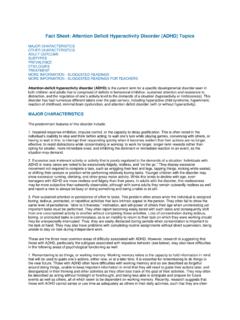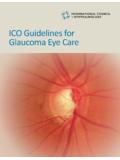Transcription of The Important Role of Executive Functioning and Self ...
1 The Important Role of Executive Functioning and Self-Regulation in ADHD Russell A. Barkley, Parents and educators dealing with children (or adults) with ADHD are likely to have heard increasing references to the terms Executive Functioning (EF) and self-regulation over the past few years. Numerous books on this topic have appeared during that time along with hundreds of scientific papers focusing on the relationship between these constructs, or ideas, and ADHD. One often hears that ADHD is a disorder of EF or that ADHD involves poor self-regulation. But what does this mean? How are these terms related to each other and to ADHD? Does this have some impact on the way in which one should manage the disorder?
2 The purpose of this guest column is to give a brief overview of these terms and what their involvement in ADHD may mean for understanding its nature and also for planning interventions for those who have the disorder. The most common form of ADHD is now known as the Combined Type. More than 2/3s to 3/4ths of people diagnosed with ADHD will be placed in this type at some time in their childhood or adulthood. This type of ADHD involves significant problems with sustained attention, persistence toward goals, resisting distractions along the way, inhibiting excessive task-irrelevant activity (hyperactivity), and inhibiting actions, words, thoughts, and emotions that are either socially inappropriate for the situation or inconsistent with one s longer term goals and general welfare.
3 The term self-regulation in psychology has a relatively specific definition. While it is often considered the means by which an individual manages themselves in order to attain their goals, it can be thought of as having at least three components. Self-regulation involves (1) any action an individual directs at themselves so as to (2) result in a change in their behavior (from what they might otherwise have done) in order to (3) change the likelihood of a future consequence or attainment of a goal. When you walk into a coffee shop and see a display counter filled with pastries or confections you face a situation that may tempt you to buy these things that are likely to ruin your plans for losing weight this month.
4 To deal with this temptation while you wait for your coffee to be prepared, you may avert your eyes from the counter, walk to a different section of the shop away from the tempting goodies, engage yourself in mental conversation about why you need to not buy those products, and even visualize an image of the new slenderer version of yourself you expect to achieve in the near future. All of these are self-directed actions you are using to try and alter the likelihood of giving into temptation and therefore increase your chances of meeting your goal of weight loss this month. This situation calls upon a number of distinct yet interacting mental abilities to successfully negotiate the situation. You have to be aware that a dilemma has arisen when you walked into the shop (self-awareness), you have to restrain your urge to order the pastry to go with the coffee you have ordered (inhibition), you re-directed your attention away from the tempting objects ( Executive attention or attentional management), you spoke to yourself using your mind s voice (verbal self-instruction or working memory), and you visualized an image of your goal and what you would look like when you successfully attain it (nonverbal working memory, or visual imagery).
5 You may also have found yourself thinking about various other ways you could have coped effectively with these temptations (problem-solving), and may have even used words of encouragement toward yourself to enhance the likelihood that you would follow your plan (self-motivation). These and other mental activities are usually included in the modern understanding of human self-regulation. Since the late 1970s, clinical researchers such as Virginia Douglas, (then working at McGill University), who were studying ADHD have asserted that the disorder likely involves a serious deficiency in the capacity for self-regulation. Why? Because they had already begun documenting through various measures that ADHD was associated with deficits in inhibition, managing one s attention, self-directed speech and rule-following, self-motivation, and eventually even self-awareness.
6 If ADHD involves difficulties in these faculties and these are the human mental abilities that are involved in our regulating our own behavior, then logically ADHD ought to be a disorder of self-regulation. Since then, research has continued to affirm the involvement of deficits in these and other mental abilities that are essential for effective self-regulation in people with ADHD resulting in a tacit acceptance of the idea that ADHD is actually SRDD (self-regulation deficit disorder). While the official name for the disorder will not be changed anytime soon in the official manual that grants names to mental disorders, it is Important that people understand this equivalence of ADHD with self-regulation deficits.
7 Also over the past 30 years, clinical researchers such as myself and many others studying ADHD have increasingly documented deficits on tests and other measures of EF. How do the above ideas about self-regulation problems in ADHD link up with these findings and the term EF itself? To understand this relationship, one has to have a clear definition of EF. Unfortunately, there is no consensus at this time on the meaning of the term EF, despite it being used prolifically in journal articles, presentations, and books about ADHD. A commonly used definition in the field of ADHD has been to refer to EF as those neuropsychological processes needed to sustain problem-solving toward a goal. Now we can begin to see a potential relationship between EF and self-regulation, because they share a similar if not identical definition.
8 Both involve goal-directed, future-oriented actions. Both involve sustaining actions over time to achieve one s goals. And both include problem-solving as part of those goal-directed actions. Moreover, when we look at a list of the mental processes most often listed as being part of the notion of EF, they include: inhibition, resistance to distraction, self-awareness, working memory, emotional self- control , and even self-motivation. These are the very mental abilities that were already identified as being essential to self-regulation. Initially in 1994, and later in 1997 in a book on ADHD, I argued for just this linkage or relationship between EF and self-regulation. Indeed, I stipulated that each Executive function can be considered to be a type or special form of self-regulation a specific class to actions that people direct at themselves to change their behavior so as to alter a future consequence or likelihood of attaining a goal.
9 In short, an EF is a specific type of action you are directing at yourself for purposes of self-regulation. We can therefore take each EF that researchers have identified and redefine it as a type of self-direct action. Inhibition becomes self-restraint, self-awareness is self-directed attention, verbal working memory is self-speech (talking to yourself, usually using your mind s voice), nonverbal working memory is seeing to yourself, or using visual imagery along with other forms of self-directed sensing (rehearing previous conversations to yourself, re-perceiving odors you previously smelled or flavors you previously tasted, etc.). And problem-solving could be thought of as self-directed play (taking apart and recombining things or ideas to create novel re-arrangements).
10 By adulthood, all of these are largely invisible to others, or mental in form, such that the person engages in them privately, to themselves, in their mind (brain). Working memory and problem-solving in fact are the ways people typically mentally represent and manipulate information that is being held in our mind (using images and words). In short, we use the various EFs for self-regulation to attain goals (alter future consequences): EF = SR. Now we can see that if ADHD is SRDD then SRDD is also EFDD. They are just inter-changeable names for the same set of problems. People with ADHD have great difficulties with using their EFs for purposes of self-regulation and attaining their goals. We can now understand that ADHD involves more than just the obvious symptoms of inattention/distractibility and impulsivity/hyperactivity, as listed in the Diagnostic and Statistical Manual for Mental Disorders, 4th Edition (DSM-IV).







